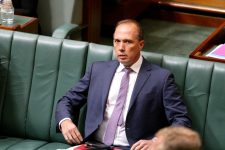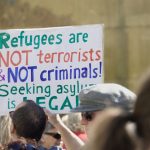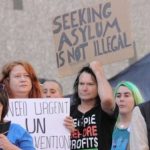Asylum Seekers Left Destitute at the Hands of Dutton

Stooping to a new low, the Turnbull government has begun cutting off the welfare payment to vulnerable asylum seekers and given these people three weeks to vacate their government-supported accommodation.
Leaked documents from the Department of Immigration and Border Protection (DIBP) initially revealed that the government planned to place former offshore detainees who were transferred to Australia for medical reasons onto new “final departure Bridging E” visas.
On August 28, Australian immigration minister Peter Dutton announced that an initial 70 asylum seekers would have their welfare payments of around $200 a fortnight cut and lose their accommodation, which will effectively leave these people destitute.
Dutton said that those affected would be provided with work rights under the terms of the new visa. These people, who were detained in harsh conditions at Nauru and Manus Island, have until now been barred from working on the Australian mainland.
Now, these people – many of whom are suffering mental health problems as a result of their protracted detention – are expected to find gainful employment, put together a bond and secure themselves accommodation within a three week bracket.
They are expected to do this in an environment where finding accommodation in the overpriced Australian rental market can be a daunting task even for those who have been in long-term, full-time employment.
Hundreds to be cut off
Figures provided by Sydney’s Asylum Seekers Centre outline that as of August 30, 18 single men and women had so far undergone their interview with the DIBP, which resulted in their Department of Human Services payments being cut, and leaving them with only a few weeks left of accommodation.
“It took everyone by surprise,” said Clare Petre, chair of the Asylum Seekers Centre. “It’s so unfair and cruel to not allow this last group to stay in Australia, particularly these people who have been here for some time.” She added that those affected include children who were born in Australia.
There are 370 asylum seekers who face being placed on the final departure visas. This includes 116 children, 50 of whom were born in Australia. There are 83 single men, 14 single women and the rest are adults within a family unit.
Let them stay
After risking their lives taking the hazardous trip to Australia by boat, these people were initially detained offshore. Some come from Iran and Syria. Others are Afghans from minority backgrounds. There are Sri Lankan Tamils, as well as members of Myanmar’s persecuted Rohingya minority.
While minister Dutton would have the Australian public believe that he is breaking up some elaborate scam run by asylum seekers who have somehow duped the federal government into providing them with millions of dollars.
The reality is rich politicians in Canberra are cutting off the lifeline to some of the most powerless people in the community without warning. And then threatening to send them back to the country from where they fled.
If the Rohingya asylum seekers were to return to Myanmar, they’d be facing brutal persecution from the government. Over the last two weeks, 400 people have been killed in their home state of Rakhine and 120,000 Rohingyas have fled across the border into neighbouring Bangladesh.
Underhanded politicking
Due to the lack of medical facilities at Nauru and Manus Island detention centres, these people were brought to Australia for treatment. Some had suffered attacks at the offshore sites, while more than 20 of the women had been subject to sexual assaults or rape.
Many of this group were involved in the unsuccessful High Court challenge to the lawfulness of the government operating the detention centre at Nauru in February last year.
The case involved a Bangladeshi woman who’d been detained at the centre, but subsequently came to Australia for medical reasons and gave birth to a baby. Her lawyers argued that no Australian law allowed the government to detain her offshore.
However, the federal government responded to this challenge by rushing through legislation in June 2015. This inserted section 198AHA into the Migration Act 1958, which gave the government blanket authorisation to do whatever it needs to support its regional processing policies.
The law came into effect on June 30 2015, but was backdated to take effect from 2012.
The public speaks
Following the High Court loss, the Let Them Stay campaign was launched so as to prevent these people being returned to offshore detention.
State premiers joined the call. Victorian premier Daniel Andrews wrote a letter to prime minister Turnbull calling on him to let the asylum seekers remain onshore. His calls were supported by Mike Baird, Annastacia Palaszczuk, Andrew Barr and Jay Weatherill.
Doctors at Brisbane’s Lady Cilento Children’s Hospital refused to release a baby who was to be sent back to Nauru, until the government agreed to let Baby Asha and her parents stay and be moved into the community.
Due to this overwhelming public support, the federal government eventually backed down and stated it would not be sending these asylum seekers back to offshore detention. The vast majority of the group were moved into community detention and have been living in Australia ever since.
Sector agencies overwhelmed
However, it seems that the government has decided it’s time to focus on this vulnerable group once more. And if these people can’t find a way to immediately establish themselves in the Australian workforce, they face being sent back to offshore detention or to their countries of origin.
Those being put onto the new bridging visas must sign a code of behaviour before entering into the community. They must also report to the DIBP every fortnight. Those who over 18 have no right to study. And if these people don’t sign their visa letter, they’re at risk of being detained.
“The saddest thing is the pressure on these people themselves, their family, and their children in particular,” Ms Petre told Sydney Criminal Lawyers®. “But there will also be a significant impact on sector agencies that are already under pressure.”
The Asylum Seekers Centre is overwhelmed with some of the 7,500 asylum seekers who were told in March that they had until October 1 to lodge their visa applications, or they face deportation. Ms Petre outlined that they’re “seeing quite a significant increase in anxiety through to self-harm.”
Ms Petre explained that the prospect of being deported is having a huge effect on all the asylum seekers subject to recent developments. “Not only in terms of loss of financial and housing support, but just in personal stress, mental health issues and impact on family,” she concluded.
Your donation to the Asylum Seekers Centre will ensure they can continue to meet the increasing needs of people seeking asylum.








